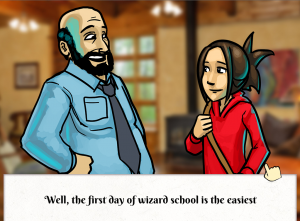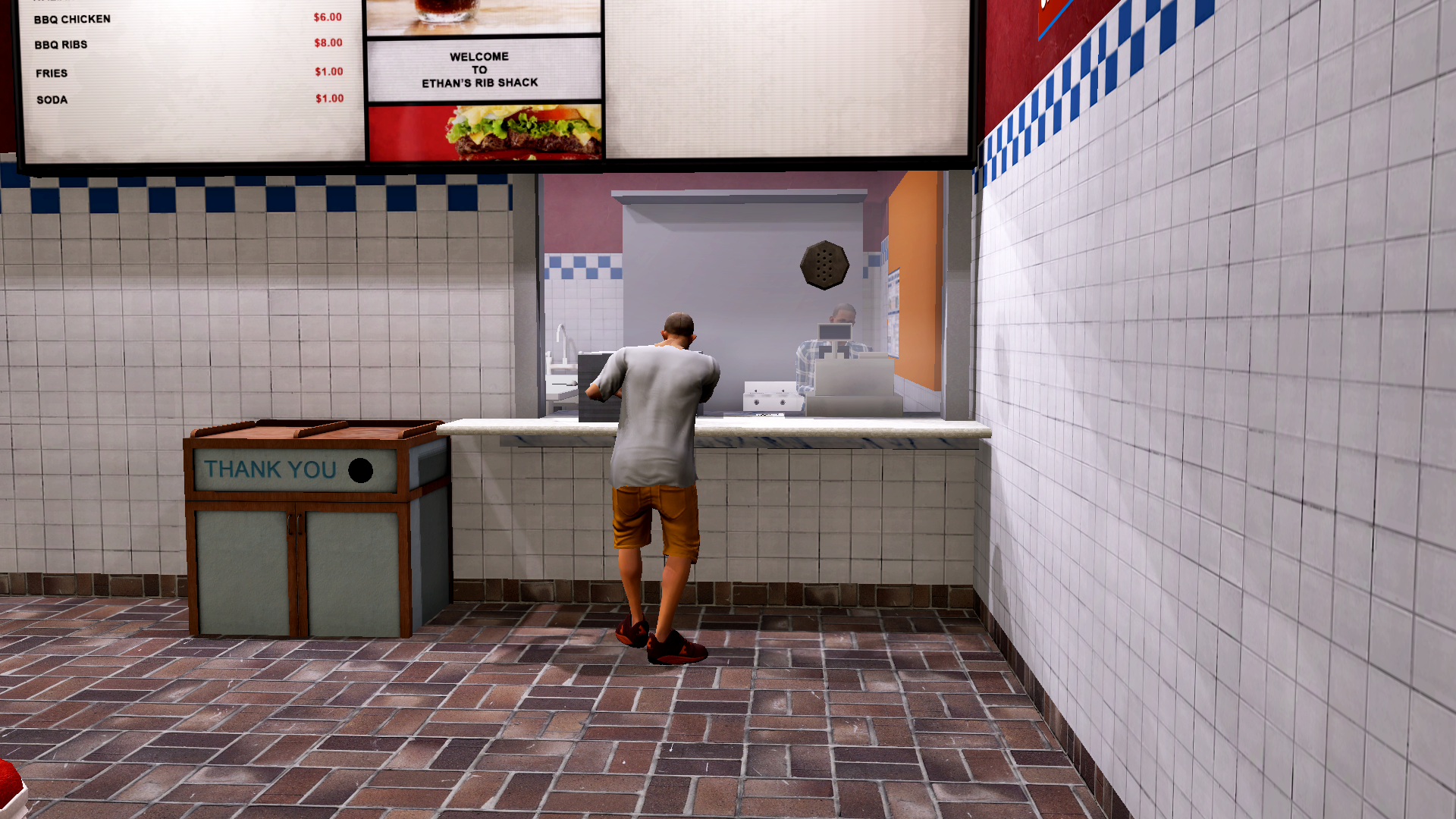
I‘m in a Hyde Park Starbucks, hunched over the laptop of game developer Rob Lockhart, trying hard to read the world as computer code. On the screen is a bird’s-eye map of rocky grassland carved up into a hexagonal grid. On one of the grid’s tiles, a pointy-haired wizard sits patiently atop her oversize magical lizard. This is Lockhart’s Codemancer, an educational video game that teaches programming skills by presenting them as magic. Codemancer proudly proclaims itself an “edugame,” and works to teach a specific, recognizable topic. It’s a product of Chicago’s growing independent game-making movement, and belongs to a vanguard of titles attempting reclaim edugaming’s misunderstood role in the industry at large.
Lockhart tutors me from across the table. “You have to chain a few things to get to this target,” he says. “You have to think from her perspective.” He gestures to a panel on the right side of the screen. In it are recessed tiles, each with etched symbols: one to move the wizard and her mount forward, one to turn them left, one to turn them right. She won’t move with the standard WASD keys; I have to drag and drop these tiles and sequence them into a command for her mount.
Lockhart claims that the game’s magical runes are all roughly one-to-one with the commands of a programming language like Python. To transition to a real programming language, players would just have to substitute his symbols for letters, numbers, and other characters. “If we can teach you how to play this game, and this game is about programming, then we’ve taught you how to program, essentially,” he says.
Practically every action in the game’s world is governed by special runic configurations. To encourage elaborate spell casting, Lockhart incorporates magic-canceling areas, and intends to provide imperfect information about the game’s world. Players will have to write longer spells to carry them through zones where they can’t cast; “if-then” conditionals will help them when ambushed by enemies.
On the screen, my wizard and her scaly companion wait for me as I tinker with basic forward movement. I start dragging the runes onto the panel’s surface, talking myself through the steps: “So go forward one, turn that way, go forward once—again. Then she needs to straighten out.” I look up at Lockhart. “That would get me where I want to go?”
I want to land on a wooden bull’s-eye, obstructed by several boulders. My on-screen wizarding instructor reminds me that I need to make the move in one spell, with one pattern. I don’t want to flunk. I’m hesitant to cast the spell.
“Try it out,” Lockhart says. “Mistakes are allowed.”

Lockhart is the head of Important Little Games, an independent studio he founded last June. He lives in Hyde Park and works out of a shared space—the Indie City Co-op, in North Center—with several other Chicago-area game developers. Educational games are Lockhart’s specialty. He first encountered edugames as a plot point in Neal Stephenson’s science-fiction novel The Diamond Age, while he was working at Wolfram Alpha, the operator of the question-answering website of the same name. Captivated by the idea of a “singular game that teaches everything,” he jumped ship for Toy Studio—a mobile and social game developer based in Chicago—to cut his teeth on game design. Lockhart volunteered at CICS ChicagoQuest, a design- and technology-focused charter school, with teachers he describes as “in the trenches” of educational game development. (“I really envy them,” he says. “They make a ton—they make, like, two educational games a week, sometimes!”)
The more Lockhart worked, the more he was convinced that games were the right way to go. “I think it would be a good life goal to make a small contribution toward a world in which there are so many educational games, in every topic, at every level, that a player can basically self-select their way through an entire education if they’re so inclined,” he says.
Lockhart recognizes that he has his work cut out for him. Edugames suffered a boom and bust through the mid- to late-nineties, and they’re still recovering. Earlier titles like The Oregon Trail and Where in the World Is Carmen Sandiego? still draw nostalgic sighs. Their cachet among players, developers, and critics points to a golden age of edugames, before publishers began pushing titles by preying on a common parental worry: their children’s educational deficiencies in an increasingly competitive world. The genre’s quality took a nosedive when player performance and improvement metrics became selling points—edugames didn’t have to be fun, or even effective. “If you put a kid in front of a boring educational game,” Lockhart says, “and they’re still not doing well in school, then—for a parent in this mindset—this is just further proof that they need to get more software. It becomes a positive-feedback situation.”
Lockhart believes that for a while, edugames were treated like games based on movies, which have traditionally been low-stakes, quick-money obligations for larger studios trying to stay in the black. “If game developers think that educational games aren’t that good, and they’re forced to make them, they’re not going to give them enough time or money to make them good.”

Today, the genre’s riddled with holes: many academic subjects lack quality games. Codemancer deploys the young-adult fiction tropes of a series like His Dark Materials or The Never Ending Story to help bring broader audiences to tougher topics. “People have a lot of sympathy toward this idea of magic as a metaphor for the increased powers of adulthood,” Lockhart says. Whenever he’s asked about the target audience for Codemancer, he answers with his own question: “Who’s the audience for Harry Potter?”
Lockhart remains excited by the possibility that edugames will eventually become the province of the flourishing independent games movement. He points to professor-developers like Jesse Schell, who defined an entire genre of “transformational games” and opened his own studio to produce them. Lockhart cites the fraternization between MIT’s Education Arcade and GAMBIT Game Lab—what he calls “the indie-game feeder team.”
“I think that this wave of edugames is really promising,” he says. “We’ve learned a lot about how to make games in general.”
Hard-hitting, decisive moments remain a hallmark of role-playing video games. The challenges posed by We Are Chicago, an upcoming adventure game set in Englewood, aims to match those realm-saving choices, blow for blow. Not knowing how to respond at the dinner table when gunshots ring out in the distance. Not knowing who to side with when mom commands you to steer clear of a well-meaning but law-defying friend. Not knowing what to tell gang members when they argue that you belong to the neighborhood and have an almost patriotic duty to defend it. Each choice demands its own measure of everyday heroism.
We Are Chicago, places players in the shoes of Aaron, a teenager about to graduate from an Englewood high school. With only two or three months of work left to go, We Are Chicago hopes to provide what newspapers, broadcasters, and documentaries properly can’t: a first-person perspective of life on the South Side.
“You hear news all the time, but it doesn’t actually explain what’s happening,” says Michael Block, the game’s lead developer. “A game really forces you to be in that situation—it’s a medium that allows the person who’s playing to have those experiences in an indirect way.”
Block has teamed up with Tony Thornton, a writer and long-time Englewood resident, to try to do the topic justice. They both freely admit they’re an odd couple. Block is twenty-six and from Wisconsin. Thornton is fifty-nine and can remember what the neighborhood was like in the seventies, when he says gangs stopped brawling and started shooting. The two artists are bent on using interactivity to reproduce the experience of daily life in a hard place.
“I hope that people will play the game,” says Thornton, “and have that experience of, ‘Wow. Oh, wow. That’s why that’s like that!’ ”

Block says he’s drawing on the storytelling model established by The Walking Dead, a video game series developed by Telltale Games where players wander the zombie apocalypse, participating in the survivors’ dramas and travails. In We Are Chicago, players have the freedom to explore a meticulously rendered Englewood at will. But the game still remains narrative-driven and tightly curated. Aaron has to navigate a web of relationships—balancing friends, his mother, a younger sister, and a pack of relatives. The goal is to preserve those bonds until he reaches graduation. Block and Thornton are out to say that in many places on the South Side, succeeding socially is often easier said than done.
“Should I tell the police about my friends? Or should I talk about these things to my mother? How will she react?” Block asks. “There are some situations where you could anger a friend enough that they stop talking to you.”
Minigames will set the mood for certain sections of We Are Chicago. “The goal that we have with minigames,” says Block, “is to get people to feel what the character would feel in that situation.” Block cites recent indie release Cart Life for these mechanics. He explains with the example of a cash-register minigame. If the character is performing monotonous money changing, players should also be performing a similarly demanding but boring task in-game. The relationship needn’t be strictly one-to-one, but should approximate the task’s oppressiveness.
“It’s forming a bigger connection with the character,” says Block. He goes on to explain Aaron’s thinking at that moment: “Hey, this job is really tedious, but I need to help pay for groceries, and to help pay for school. Because if I don’t—we don’t eat.”
Block emphasizes that We Are Chicago will do work that’s still unusual for the medium. “This isn’t just a game. This is not just some fun thing because we wanted to entertain people.”
Thornton picks up the thought: “It’s a learning experience.”
Block and Thornton talk about making We Are Chicago into something more than “just a game.” They’re striving for an anthropological document. Players will have to converse with an entire community and get to know in order to manage their likes and dislikes. “My challenge,” Thornton says, “is to be true to those characters.”

Thornton brings his writing and life experience to Block’s game-making practice. The kind of language that the character Aaron uses, for instance, isn’t insignificant. “I went through this as a child,” Thornton recalls. He and his brother “spoke the King’s English in our home. But when I was in the street, I had to learn to speak the dialect that didn’t set me apart.” He’s made sure that distinctions like these find their way into his script. Something as small as forgetting to say grace before a family meal has large implications in the game. “There’s a facet of humanity right there that is completely missed!”
Throughout the development process, Block worked with Thornton to make sure the game was as accurate as possible. “I had originally placed you and your younger sister in the same bedroom. And Tony brought up that that wasn’t an accurate situation,” he says. “If it’s not accurate, and we need to change something, and that takes time—we need to change it!”
Accuracy became more important as Thornton realized that We Are Chicago wasn’t just for people “outside of the experience.” He now believes he has to meet the scrutiny of Englewood itself. He uses the example of writing a word on your hand and holding it so close to your face that you can’t read it; We Are Chicago could provide necessary perspective.
“I would like to see even the people who live in—who languish under—this set of circumstances also come to the game, and see something clearly that they hadn’t seen before,” he says. “I don’t want them to look and say that ‘I’d never say that! I’d never do that!’ I want it to be so real that they would see themselves in it and, maybe, see themselves clearly.”
I ask Rob Lockhart if he thinks that Block’s We Are Chicago qualifies as an edugame. He calls it a “persuasive game,” a concept first proposed by Ian Bogost, a professor and game critic.
“Certain parts about the life of somebody in a low-income area on the South Side of Chicago are…not fun,” says Lockhart. “One of the interesting things about a persuasive game is that you can selectively make parts of it not fun. Purposely.”
Lockhart describes We Are Chicago in the terms of its procedural rhetoric: the messages that developers communicate through the types of play they leverage. Because Codemancer, despite making the demands of a challenging computer science class, needs to win itself an audience, it has to also be enjoyable, and offer fun opportunities for play.
We Are Chicago can ironically disrupt that preconception and force players to ask, in Lockhart’s words, “This is not fun—why is this not fun?” He believes that introducing the unpleasant into a game environment can be powerful.
“That knowledge of teaching has bled into the educational game space. That’s a good thing,” says Lockhart. “It’s a difference between the last golden age of educational games and then a dark age.”
He laughs. “And now we’re in the silver age, I think.”
Although We Are Chicago lacks panels of interlocking code tiles, it still aims to teach players about a system—a site-specific package of social norms and frustrating conditions that the nightly news can’t fully capture. Games can approximate experience, in the way that the practice of magic in Codemancer provides an analogy to Python.
Block acknowledges that the game’s story is not “particularly happy.” Aaron’s graduation represents a net good, and there are positive moments—“because everybody has positive experiences in their lives,” he explains. But Block admits that he walks a thin line between alienating his players and stressing to them that people are “working very hard, and being very active in trying to remedy these problems, and get out of the situation that they’re in.”
“But it’s just not always possible, and it’s not easy,” he says.
At the end of the day, Block believes that there’s nothing you can read or watch that can do the same vital work as video games. We Are Chicago intends to teach an ambitious crash course in the messy games people play—not because they want to, but because they have to: with parts of their community, their employers, even their loved ones.
I put the same question to Block and Thornton: Do they think of their project as an educational game? Block feels that edugames carry too much of a particular stereotype for him. He shifts his weight and thinks.
“I don’t necessarily see this as teaching skill. It’s more about expanding your understanding of the world and of your understanding of people—”
“Well, if that’s not education,” interrupts Thornton, “then what is?”


Hello, Stephen. In spite of waiting, rather impatiently, I might add, for the publication of this very interview, I somehow missed your notification amongst the myriad emails peddling an array of things I didn’t know I couldn’t live without. I was pleasantly surprised, after all this time, to stumble upon your email informing me of your post. I am so thoroughly impressed with your skills as an interviewer and writer, that I pledge to make this site a permanent address for my weekly visitations online. Thank you for your incisive, insightful reportage and I hope our paths cross, again. I remain, faithfully yours, Tony Thornton.